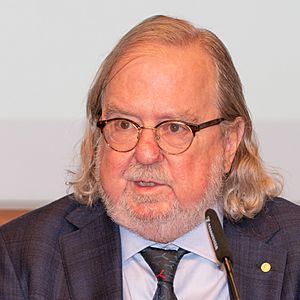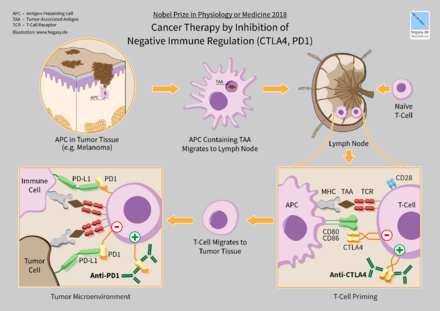James P. Allison facts for kids
Quick facts for kids
James Allison
|
|
|---|---|

Allison in 2018
|
|
| Born |
James Patrick Allison
August 7, 1948 Alice, Texas, U.S.
|
| Education | University of Texas, Austin (BS, MS, PhD) |
| Known for | Cancer immunotherapy |
| Spouse(s) |
Malinda Bell
(m. 1969; div. 2012)Padmanee Sharma
(m. 2014) |
| Children | 1 |
| Awards | Breakthrough Prize in Life Sciences (2014) Massry Prize (2014) Tang Prize (2014) Louisa Gross Horwitz Prize (2014) Harvey Prize (2014) Gairdner Foundation International Award (2014) Paul Ehrlich and Ludwig Darmstaedter Prize (2015) Lasker-DeBakey Clinical Medical Research Award (2015) Wolf Prize (2017) Warren Alpert Foundation Prize(2017) Balzan Prize (2017) Sjöberg Prize (2017) King Faisal International Prize (2018) Albany Medical Center Prize (2018) Dr. Paul Janssen Award for Biomedical Research (2018) Nobel Prize in Physiology or Medicine (2018) |
| Scientific career | |
| Fields | Immunology |
| Institutions | M. D. Anderson Cancer Center Weill Cornell Medicine University of California, Berkeley University of California, San Francisco University of Texas at Austin |
| Thesis | Studies on bacterial asparaginases: I. Isolation and characterization of a tumor inhibitory asparaginase from Alcaligenes ?Eutrophus. II. Insolubilization of L-Asparaginase by covalent attachment to nylon tubing (1973) |
| Doctoral advisor | Barrie Kitto |
James Patrick Allison (born August 7, 1948) is an American immunologist. An immunologist is a scientist who studies the immune system, which is your body's defense against sickness. Dr. Allison is also a Nobel Prize winner.
He works as a professor and head of immunology at the MD Anderson Cancer Center in Houston, Texas. His amazing discoveries have led to new ways to treat some of the most serious cancers. He also helps lead the scientific advisory council for the Cancer Research Institute (CRI).
Dr. Allison is famous for his work on how special immune cells, called T-cells, work. He helped create new ways to use the immune system to fight cancer. He was also one of the first scientists to find a key part of the T-cell, called the T-cell receptor.
In 2014, he won the Breakthrough Prize in Life Sciences. In 2018, he shared the Nobel Prize in Physiology or Medicine with Tasuku Honjo for their work on cancer treatments.
Contents
Early Life and Education
James Allison was born on August 7, 1948, in Alice, Texas. He was the youngest of three sons. When he was in eighth grade, his math teacher inspired him to become a scientist.
He spent a summer in a science program at the University of Texas, Austin. He even finished his high school biology course by mail! Allison earned his first degree in microbiology from the University of Texas, Austin, in 1969. He then earned his PhD in biological science from the same university in 1973.
A Career in Science
After finishing his studies, Dr. Allison worked as a researcher at the Scripps Research Institute in California. He then joined the MD Anderson Cancer Center as a biochemist and professor.
In 1985, he became a professor at the University of California, Berkeley. He also worked at the University of California, San Francisco. Later, in 2004, he moved to the Memorial Sloan-Kettering Cancer Center in New York City. There, he directed a center focused on using the immune system to fight cancer.
Since 2012, he has been the head of immunology at the MD Anderson Cancer Center. He is a member of important science groups like the National Academy of Sciences. He also advises the Cancer Research Institute.
Understanding Cancer and the Immune System
Dr. Allison's research has focused on how our immune system fights diseases, especially cancer. He studied human leukocyte antigens (HLA) and T-cells. These are important for helping the immune system tell the difference between healthy body cells and harmful invaders.
In 1977, he found that the immune system sometimes doesn't attack cancer cells. This happens because certain proteins can stop the immune system from working properly. Finding these "stop signals" was a big step in developing new cancer treatments.
In 1982, Dr. Allison made a major discovery: he found the T-cell receptor. This receptor is like an antenna on the T-cell that helps it recognize invaders.
Unleashing the Immune System
In the 1990s, Dr. Allison discovered a molecule called CTLA-4. He showed that CTLA-4 acts like a "brake" on T-cells. This brake stops T-cells from attacking cancer cells.
In 1996, he showed that if you block this CTLA-4 "brake" with a special medicine, the T-cells can then attack and destroy tumors. This idea of blocking the "brakes" on T-cells is called "immune checkpoint therapy."
This groundbreaking work led to the creation of a medicine called ipilimumab (Yervoy). In 2011, this medicine was approved to treat a serious type of skin cancer called metastatic melanoma.
Dr. Allison continues to study how the immune system responds to cancer. He wants to find new ways to use the body's own defenses to fight cancer and other diseases.
Awards and Recognition
Dr. Allison has received many important awards for his work. Between 2010 and 2019, he received more top international science awards than almost anyone else.
Some of his major awards include:
- The Breakthrough Prize in Life Sciences (2014)
- The Tang Prize in Biopharmaceutical Science (2014), shared with Tasuku Honjo
- The Lasker-DeBakey Clinical Medical Research Award (2015)
- The Wolf Prize in Medicine (2017)
- The Nobel Prize in Physiology or Medicine (2018), shared with Tasuku Honjo
The Nobel Prize was given for their discovery of how to treat cancer by stopping the immune system's "brakes." His work has been featured in a 2019 documentary film called "Jim Allison: Breakthrough."
Personal Life
James Allison married Malinda Bell in 1969, and they had one son. They later divorced in 2012. In 2014, he married Padmanee Sharma, who is also a scientist. He is a stepfather to her three children.
Dr. Allison's mother passed away from lymphoma when he was 10 years old. His brother also passed away from prostate cancer in 2005. These personal experiences likely influenced his dedication to cancer research.
Outside of his scientific work, Dr. Allison enjoys playing the harmonica. He plays in a blues band with other scientists who study the immune system and cancer. The band is called "The Checkpoints." He also plays with a local band called "The Checkmates."
See also
 In Spanish: James P. Allison para niños
In Spanish: James P. Allison para niños
 | Jewel Prestage |
 | Ella Baker |
 | Fannie Lou Hamer |


